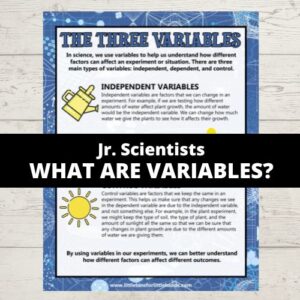In science, variables are any factor that can be changed in an experiment to help us understand how different factors can affect an experiment or situation.
Specifically, three different variables help us answer the question we are investigating. Identifying these variables before you start will guide your decisions about how to conduct your experiment and how to measure the results.
💡 We use variables when we apply the scientific method to our experiments.
Three Types of Variables
The three kinds of variables are independent, dependent, and controlled variables. You want to implement variables in any scientific investigation to ensure a fair test.💡 Let’s use our Plant Growth Experiment as an example to understand the variables better.
Independent Variable
In a science experiment, the independent variable is the factor you will change. This variable affects the dependent variable. You can identify the independent variable by looking at what can exist in differing amounts or types and what is directly related to your experiment’s question. 👉 For example, if you are testing how different amounts of water affect plant growth, the amount of water would be the independent variable. You can change how much water you give the plants to see how it affects their growth.💡 Remember, choose only one independent variable for your experiment!
Dependent Variable
The dependent variable is the factor that you observe or measure in an experiment. It is the variable that is affected by changes made to the independent variable. Note: the number of dependent variables can be more than one. 👉 The dependent variable would be the plant’s growth. We are measuring the plant’s growth to see how it is affected by the volume of water it is given.Controlled Variables (Constant Variables)
Control variables are the factors that you keep the same in the science experiment. This helps ensure that any changes in the dependent variable are due to the independent variable and not something else. With some experiments, you may choose to set up a control that has no amount of the independent variable added to it. All other factors are the same. This is great for comparison. 👉 For example, in our plant growth experiment you would keep the type and amount of soil, including the type of fertilizer, the type of plant, and the amount of sunlight, all the same, so that you can be sure that any changes in plant growth are only due to the different amounts of water you give them. You could also have one plant that you give no water.Grab the printable science project variables sheet!

Variables and Writing A Hypothesis
Choosing variables is essential for writing a good hypothesis because variables help you define what you are testing and observing in a science experiment. A hypothesis predicts how one variable (the independent variable) affects another (the dependent variable). It explains the relationship between the independent and dependent variables.
💡 Learn more about how to write a good hypothesis for kids.
